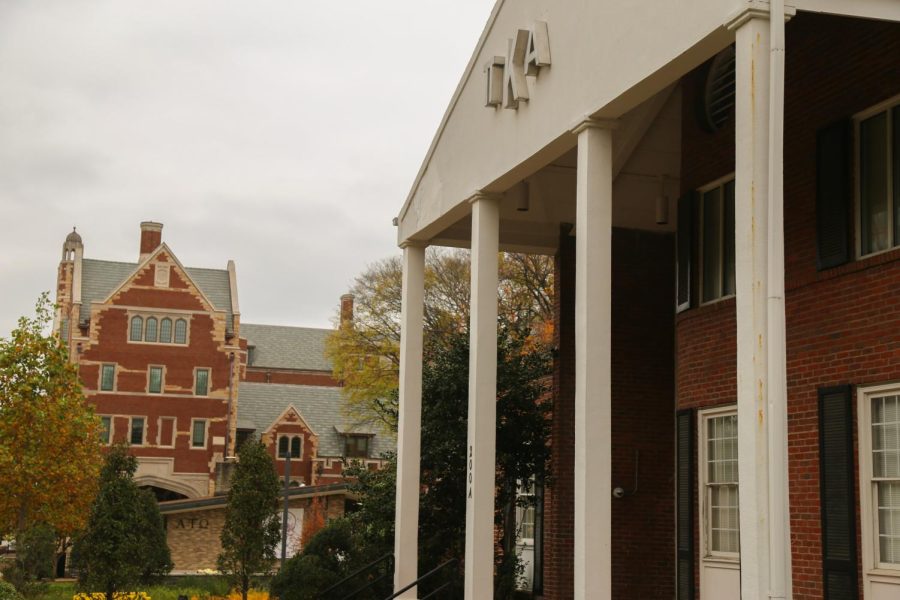Coming to Vanderbilt, there was never a doubt in my mind that I would rush—both my parents were a part of Greek life and loved the people they met. Rush was a complete blur, full of straightened hair, makeup, smiles, laughs and small talk. I was excited for the opportunity to meet so many new people and become part of a new family. What I didn’t realize were the systemic issues deeply rooted in this organization, something that has been so well-hidden and so normalized throughout the years that even those who were directly affected did not speak up.
As a rising sophomore in Greek life, my initial reaction to the calls for abolishment was one of questioning. Why are people trying to tear down something that I love, an institution that has given me great friendships and a sense of sisterhood? However, more recently, I’ve found myself thinking more about Greek life as a whole, and I’ve come to understand how Greek life is an institution that perpetuates a separate but equal system; not just in terms of race, but socioeconomic class, personality, appearance, social status and more. Externally, there are economic and racial issues, as well as social expectations that may drive people away. Internally, there is drug abuse, patronizing behavior and physical pressure that can lead to self-esteem issues.
Ultimately, I found that the social benefits I’ve gleaned from the system could not make up for the people I excluded and the system I perpetuated. The fact is, Greek life was founded on elitist principles which created deep-rooted systemic issues, and these issues cannot be reformed in our time here. In order for this system to truly change, years of work must be put in for valuable reform. Because these exclusionary factors are inherent to the system, small reforms will not be enough to erase the stigmas and implicit biases at play. While I am dropping and believe that doing so will allow me to work towards the erasure of these biases and stigmas, those in favor of reform must ask themselves how we can change a system that was made with the intent to exclude.
Greek life heavily lends itself to the exclusive, elitist principle of socioeconomic status. As a former member of Greek life, I know first hand how expensive everything can be, starting with a thousand dollars per semester for dues—not to mention event prices, t-shirts, lettered sweatshirts, date parties and fundraising. But it doesn’t end there; being part of Greek life means that there is an expectation to the way one appears on campus and at events. The pressure to spend money on certain styles of clothing and the silent expectation of buying new dresses or outfits for formals and rush don’t go unheard. For those who pay for themselves like me, the financial burden is heavily understood. Not only does this isolate those who can’t afford to be in Greek life, but it even creates a class divide between people in it. Although there are scholarships, they are extremely difficult to acquire and often do not cover the entirety of dues or extra fees. Even with more scholarships and better access to allow for financial inclusivity, the lifestyle that is perpetuated by sororities and fraternities is still expensive and financially exclusive.
After coming to Vanderbilt from an extremely diverse area, the majority whiteness of Greek life was apparent to me. There is a “separate but equal” sentiment on campus due to IFC and Panhellenic organizations being separate from the NPHC, historically Black sororities and fraternities. Many BIPOC (Black, Indigenous, People of Color) may feel unwelcome at a house that is primarily white, even with reforms. Many changes have been made to Greek life to make it more inclusive and promote diversity, but if people do not feel welcome enough to rush, those changes do little to make an impact.
Furthermore, because of implicit social and racial biases, those in charge of the rush committees in sororities will often subconsciously select a whiter pledge class despite the new diversity promoted through reforms. Alternatively, sororities have picked BIPOC students, allowing the organization to appear diverse, without truly trying to create an empowering environment. During my rushing process as a half-Asian woman with a racially ambiguous appearance, I found myself white-washing my personality to fit in with those I saw around me, both in the houses and around other potential new members (PNM). I, along with others I know, succumbed to these pressures to act more “white” rather than embracing our ethnicities, and I allowed these pressures to continue after rushing. My experience proves to me that Greek life dissuades POC from wanting to rush or feeling welcomed during rush.
Moreover, racism and appearance discrimination is present in the rush process. During rush, the girls who interact with the PNMs tend to be as racially diverse as the house can make them without representing the diversity of the house itself. They also tend to be on the “prettier” side, and though that may sound harsh, it’s a representation of pretty-privilege in Greek life—something that can go on to create self-esteem issues. I know girls who felt body-shamed or out of place in their sorority, leading to eating disorders, body dysmorphia and extremely low self-confidence.
Even after rushing, this beauty standard throughout the nation is present in most houses. Although not outright, and less so at our school, some sororities will only take blondes. Some sororities will only post beach-ready girls on their social media. Many sororities at other schools will give members makeup and hair guidelines, including straightening or curling hair and filling in or shaping eyebrows. Even at our school, there’s strong pressure to follow similar beauty standards especially during rush. Practices like this are demeaning, racially exclusive and force a biased interpretation of “femininity” that can easily take women out of their comfort zones by not staying true to themselves. Although every sorority likes to say that they are inclusive, they subconsciously will filter out those who do not fit this beauty standard.
Internally, there are many deep-rooted issues that we need to address. Firstly, there is a superiority complex that exists in certain sororities and fraternities that ranks different organizations. This ranking can also have effects on members of these “superior” or “inferior” organizations. I know that many of us, myself included, were guilty of this during rush, as some sororities were mentally blocked out or written off because of their standing. Maybe we did it subconsciously because the person who invited you in wasn’t the image of beauty, or because we were already aware of the sorority’s “ranking”. I know people that almost or did drop out of rush because they got cut from a top tier sorority and didn’t want to be in anything else. I know people who don’t attend certain parties because a “low-tier” fraternity was throwing it. It’s toxic and causes sororities and fraternities to not only see themselves as “better” than other organizations but better than non-Greek students as well. Further, these top tier groups are seen as the popular or socially influential people on campus and, from my observations, as the ranking increases, the diversity decreases. This means that this tier system pushes the richer, less diverse person to the top of the social ladder.
Despite all the negatives, there are positives to Greek life. There are lifelong connections that come with sisterhoods. The philanthropy that every sorority and fraternity invests time in is also a positive. The Delta Delta Delta sorority (Tri Delta) is one of the largest donors to St. Jude, raising more than $45 million in the last 20 years. Without Tri Delta, I would not have met so many of the amazing people I’ve come to love today. Greek life can provide a home-like environment and give members a family away from their families. For me, sorority basketball was one of the best groups that I joined and something that I would not have found without Greek life. The bonding, Bachelor nights, bigs and littles and other sisterhood events all contribute to what makes Greek life great.
However, in my mind, the social positives could not outweigh the political negatives.
My decision to drop Tri Delta has nothing to do with my house and the girls around me but rather everything to do with my political and moral self. To be in Greek life, I’ve let go of my personal morals; I have allowed myself to change in minor ways, letting myself look down on others subconsciously and letting go of my Asian heritage. Mostly, I allowed myself to let go of aspects of my personal identity that made me unique in an effort to fit in and conform to the culture of Greek life.
The depth of the systemic issues of Greek life are not something that can be reformed in our time here. I believe that these issues are so deep-rooted in how the system is done that changing small aspects of rush or other events will not be enough to erase stigmas and implicit biases. Evaluating myself and my commitments, I do not believe that I will have time to make an impactful change. By dropping, I will be holding myself and others accountable for their actions and striving for an inclusive community. I will be returning to my true identity which includes having those bold political conversations that I have let myself shy away from this year.
I implore every person in or thinking of joining Greek life to look deeply into your moral and political consciences and reflect on where you stand with this movement. I understand the difficulties of leaving behind a community that may become your lifelong family and provides you with wonderful opportunities. Think about what reform means to you, how you will help to enact it and if it will be enough. I know individual chapters can be better and will be better but recognize that that is not the end. The entire system must be reformed to make an impact, not just one chapter. Reflect on who you are as a person and if you feel welcomed into this community and recognize why—perhaps it is your privilege, the color of your skin or your demeanor. Trust yourself and your morals, and make a decision that, when reflected upon ten or 20 years from now, you can still stand by.


















